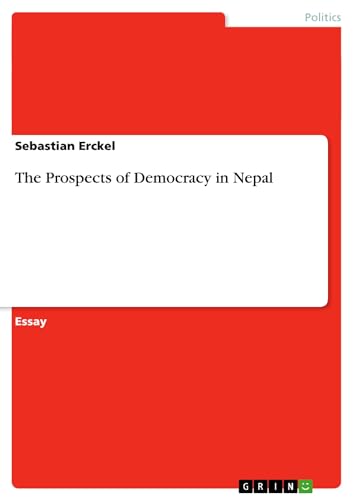Articoli correlati a The Prospects of Democracy in Nepal

Le informazioni nella sezione "Riassunto" possono far riferimento a edizioni diverse di questo titolo.
- EditoreGRIN Verlag
- Data di pubblicazione2009
- ISBN 10 3640327373
- ISBN 13 9783640327379
- RilegaturaCopertina flessibile
- Numero edizione2
- Numero di pagine24
Compra nuovo
Scopri di più su questo articolo
Spese di spedizione:
EUR 23,00
Da: Germania a: U.S.A.
I migliori risultati di ricerca su AbeBooks
The Prospects of Democracy in Nepal
Descrizione libro Taschenbuch. Condizione: Neu. This item is printed on demand - it takes 3-4 days longer - Neuware -Essay from the year 2008 in the subject Politics - International Politics - Region: South Asia, grade: good, University of Kerala (Department of Political Science), course: Politics of South Asia, language: English, abstract: This essay analyses the chances for democracy in Nepal after the declaration of the Republic of Nepal. This is done by examining earlier experiments with democracy and the reasons for their failure. The main actors of Nepali politics, namely the so- called democratic parties (Nepali Congress and the Left), the Monarchy and the Maoists, receive special attention. South Asia is widely considered to be one of the most volatile regions in the world. In the roughly60 years since the end of the colonial era the region has witnessed almost all possible types ofinternal and external conflicts- from wars between states to military takeovers, ethnicinsurgencies and social uprisings. While every country was affected, the distinct geographicaland cultural features of South Asia contributed to a dangerous interrelatedness of these conflicts.The situation has become even more threatening after both India and Pakistan successfullytested nuclear weapons in 1998.However, the year 2008 has seen some remarkable developments in South Asia that givereason to look at least cautiously optimistic into the future. In Pakistan, elections marked thereturn to civilian rule, Bhutan experienced its first elections ever, and in Nepal a ConstituentAssembly was elected that shortly afterwards abolished the world's last Hindu monarchy bydeclaring the country a federal and secular republic. Furthermore, the caretaker government inBangladesh has announced its plans to hold elections at the end of the year.Nonetheless, history indicates that a reversal of these developments cannot be ruled out. It istherefore necessary to evaluate the prospects of democratisation in the light of past events. Thispaper attempts to assess the chances of a successful democratisation process in Nepal on thebasis of an analysis of the factors responsible for the failure of democracy in the past. 24 pp. Englisch. Codice articolo 9783640327379
The Prospects of Democracy in Nepal
Descrizione libro Taschenbuch. Condizione: Neu. Druck auf Anfrage Neuware - Printed after ordering - Essay from the year 2008 in the subject Politics - International Politics - Region: South Asia, grade: good, University of Kerala (Department of Political Science), course: Politics of South Asia, language: English, abstract: This essay analyses the chances for democracy in Nepal after the declaration of the Republic of Nepal. This is done by examining earlier experiments with democracy and the reasons for their failure. The main actors of Nepali politics, namely the so- called democratic parties (Nepali Congress and the Left), the Monarchy and the Maoists, receive special attention. South Asia is widely considered to be one of the most volatile regions in the world. In the roughly60 years since the end of the colonial era the region has witnessed almost all possible types ofinternal and external conflicts- from wars between states to military takeovers, ethnicinsurgencies and social uprisings. While every country was affected, the distinct geographicaland cultural features of South Asia contributed to a dangerous interrelatedness of these conflicts.The situation has become even more threatening after both India and Pakistan successfullytested nuclear weapons in 1998.However, the year 2008 has seen some remarkable developments in South Asia that givereason to look at least cautiously optimistic into the future. In Pakistan, elections marked thereturn to civilian rule, Bhutan experienced its first elections ever, and in Nepal a ConstituentAssembly was elected that shortly afterwards abolished the world's last Hindu monarchy bydeclaring the country a federal and secular republic. Furthermore, the caretaker government inBangladesh has announced its plans to hold elections at the end of the year.Nonetheless, history indicates that a reversal of these developments cannot be ruled out. It istherefore necessary to evaluate the prospects of democratisation in the light of past events. Thispaper attempts to assess the chances of a successful democratisation process in Nepal on thebasis of an analysis of the factors responsible for the failure of democracy in the past. Codice articolo 9783640327379

